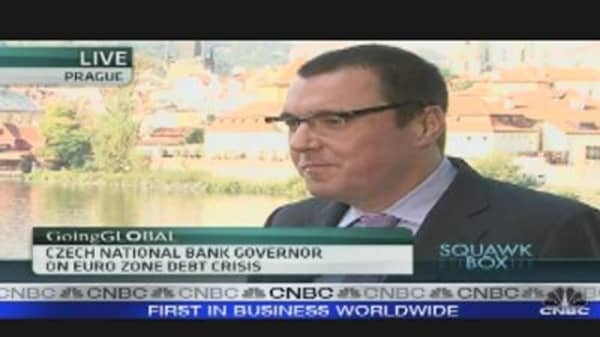A bigfair for the Central and Eastern European industry will take place in the Czech city of Brno next week, and its organizers came to the capital Prague on Tuesday to brief the media about it.
But fear of another downturn in the world economy lurks behind the smiles and relaxed atmosphere in the capital; the Czech Republic is heavily reliant on exports to the euro zone, especially Germany, for its economic growth.
"At the moment, it seems that the economy is getting better but we hear alarming news from the euro zone," Jiri Kulis, CEO and vice-chairman of BVV Trade Fairs Brno, told CNBC.com in Prague.
The number of companies taking part has increased by 30 percent to 1,600 this year and the fair is "a localized mirror of the local economy," Kulis said.
Around a third of Czech exports go to Germany and news of a slowdown in manufacturing in the European Union's biggest economy did not go down well in Prague.
The government is trying to help companies find new markets to diversify away from the euro zone, Martin Tlapa, deputy minister of industry and trade, told CNBC.com. The Brno fair will help them do just that.
"Czech companies understand that Eastern Europe, Russia especially, is a market to diversify to," Radoslav Klepac, director for external relations at BVV Trade Fairs Brno, said.
Apart from Russians, the fair has attracted Turkish business people; its organizers hope to persuade India to become a partner next year and are in negotiations with China.
The slowdown in Europe's developed markets and the rise of emerging countries can even be felt on Prague's picturesque streets. On the famous Charles Bridge, sellers of art have seen the demographic of tourists changing.
"It's better than two years ago, this year we have much more tourists than in the last two years," Martin, who has been selling his art photography on the bridge for the past six years, said. "But now we get a lot of people from Russia. American tourists are very poor, something has changed."
Fearful Eyes on Germany
The need for diversification is only set to increase, as the fear of a slowdown in the developed states is rising.
By day, Jan Prochazka is a managing director of investment advice firm Cyrrus, a company that is trying to entice retail investors to get into the Czech capital markets. He is also a sort of unofficial government advisor by night.
Together with about 15 other economic experts from banks, industry and universities making up an ad-hoc National Economic Council - working pro bono and after hours - Prochazka is putting together a strategy on how the Czech Republic can withstand economic headwinds coming from the euro zone.
He probed CEOs of various Czech companies to see how optimistic they are about the future and says that although they say the slowdown has had no impact yet, some of them saw some signs that another crisis may be coming.
"They don't want to give numbers but they say that German colleagues are not sending as many orders [for goods]," Prochazka said. "I think if Germany goes into recession, we'd be there in weeks."
Among the measures the National Economic Council is proposing to prop up the economy in the event of the crisis is a cut in social security taxes. The council submitted more reform proposals to the government six months ago, to increase the depth of capital markets to help companies get more financing via the stock exchange.
In the Czech Republic, initial public offerings (IPOs) are rarer than national holidays. According to Prochazka, there are maybe one, two a year maximum and part of the reason for this is the fact that banks do not encourage them as they gain more from offering loans to companies to finance themselves.
"In the Czech Republic, if there is an IPO, it's an exit IPO, some private equity group exiting," he said. "I think there are so many good companies that could go public. There are so many companies that are state-owned, and I don't think the state is a good owner."
Selling a 20 to 30 percent stake in state companies such as petrol distributor CEPRO, power grid administrator CEPS, in the Czech Post or in Czech Aeroholding – made up of flag carrier CSA and the Prague airport – on the stock market would bring money to the state coffers and it would also boost the local market and retail investment, Prochazka said.
The market may get a boost in 2013, when the 15 percent tax on dividends will be lifted, but that is very much priced in, according to Prochazka. However, he and his company hope more retail investors will get into the market once the tax is abolished.
"For the retail investor, it makes sense to have a dividend title and wait for the dividend each year," he explained.
Next year, the government plans to implement pension reforms under which some funds from the state pensions will be transferred into the so-called second pillar system – private pension funds which will invest the money on the capital markets.
There is still controversy about the system, but Prochazka hopes it will add depth to the capital market. Currently, despite some analysts calling the country a safe haven because of its solid macroeconomic conditions, the market is so shallow that any big investor getting in or out would likely cause wild swings.
"If a Canadian pension fund wants to invest in something, the price would shoot up," said Prochazka. "You can only put a small part of your portfolio in the Czech Republic."
- Petr Bokuvka in Prague contributed to this story





